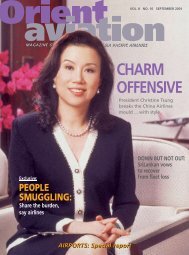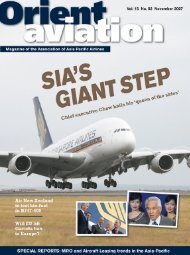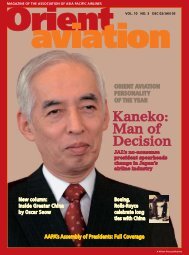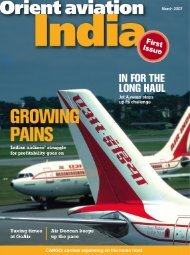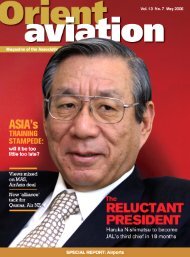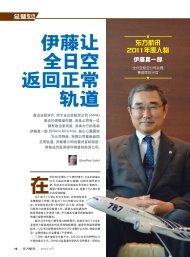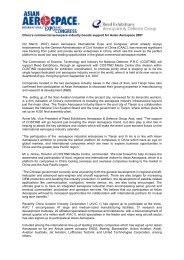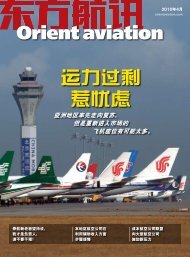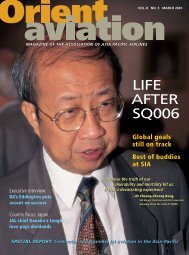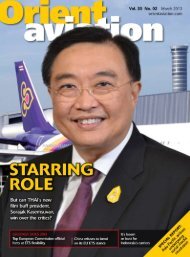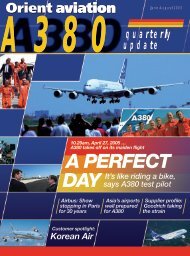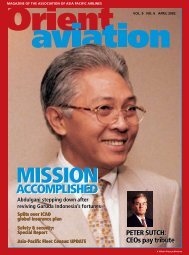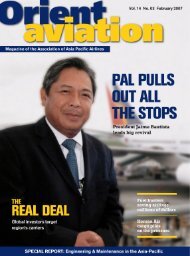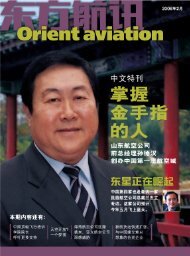OAMag-V7N4-Cover [Converted] - Orient Aviation
OAMag-V7N4-Cover [Converted] - Orient Aviation
OAMag-V7N4-Cover [Converted] - Orient Aviation
- No tags were found...
Create successful ePaper yourself
Turn your PDF publications into a flip-book with our unique Google optimized e-Paper software.
s a f e t yPromising signsCAL pulling no punches in safety driveThe acting director of China Airlines’(CAL) operations division, Capt. ChouYu-Sen, is not a man to beat aboutthe bush.“Any pilot who does not meet the standardswill be grounded,” he said. The words arequietly spoken, the smile is warm, but there isno hiding Capt. Chau’s determination. It hasalready happened in a few cases.They are given every opportunity to provethemselves, but the days of the much-criticised,autocratic “macho” military pilots rulingthe CAL cockpit ‘roost’ are numbered.Lack of communication on the flight deckin Taiwan, Korea and China, all of whom hire ahigh percentage of ex-military men, has contributedto accidents and incidents in recentyears. CAL has admitted it has had a ‘cultural’problem with its older, former military pilots.Capt. Chou is a former military pilot. Butsince then he has worked in Singapore andhelped Taiwan’s second international airline,EVA Air, set up their training department afterit was launched in the late 1980s. Attitudes arechanging, said Capt Chau.Since the CAL Taipei crash two years ago,which killed 201 people, every CAL pilot hashad to return to school to be tested and,where need be, re-trained. The trainers, too,have been re-trained.With the assistance of consultants LufthansaTechnik, CAL has introduced strict newEnglish language standards, compulsorycockpit resource management (CRM) classesfor all flight crews and up to nine months“brainwashing” or crew pre-qualification(CPQ) courses, for new military recruits andab initio graduates.It’s a cliché, but no stone has been left unturned.A 48-point “continuous improvementproject” or gai jin as it is called in Chinese, isin operation and constantly under review.It covers everything from pilot qualificationand selection to improving flight standardsand upgrading CRM and LOFT training tolanguage skills in the air and on the ground. Italso incorporates updating operations manualsand establishing performance monitoringsystems.The maximum age for former militarypilots eligible to join CAL has been lowered to40. Only two were accepted in 1999. Instructorpilots and check captains also have felt theheat in the last 12 months. All of them had tobe re-certified and take a 14-day enhancementcourse. Of the 135 tested, 15% failed the writtenor oral examination.“They took it too lightly,” said CAL presidentSandy K. Y. Liu. “They thought it wasmore ceremonial than practical.”They were told they would only be allowedone re-test. Anyone who failed wouldbe stripped of their instructor/check captainrole. All but two passed the second time.Acting director of operations Capt.Chou Yu-Sen: pulls no punchesCAL knows it has to play hard ball. But arethey playing hard enough? The airline’s expatriatepilots are its strongest critics, but eventhey concede CAL has made recent significantimprovements.The standard of English, they say, hasshown a sharp improvement; CRM less so,but it is still better than a couple of years ago.There are allegations that some local pilotsare given “an easy ride” by some of their exmilitarysuperiors.CAL has a shortage of pilots and a vigorousrecruitment campaign to build its cockpitranks is under way world-wide. By the endof 1999 the airline had 783 cockpit crew: 363captains, 315 first officers, 39 cruise captainsand 66 flight engineers.Of these, 393 are ex-military pilots, with200 ab initio graduates and 124 expatriates.An advertising campaign for expatriate cruisecaptains attracted 120 applications up to mid-December. The operations department is fastbecoming a melting pot of nationalities. CRMwill be ever more critical and the need forgood English more important. Recruitmentof native speaking English pilots has helpedfoster better attitudes on the flight deck,sources told <strong>Orient</strong> <strong>Aviation</strong>.CAL has established a mandatory Englishlanguage standard for its local pilots: Testof English International Communications(TOEIC). The airline has three English instructorsand all local flight crew have to take atest to achieve TOEIC 550 level. This includesnew military recruits. TOEIC 600 is necessaryto upgrade to captain.Anyone who fails the test will be relegatedto ground duties. In the past CAL hascancelled schedules to accommodate extensivepilot training. This was particularly thecase after the Taipei crash in 1998.While the current shortage of pilotscontinues CAL president, Sandy Liu, said theairline would continue to cut back on schedulesto facilitate training of new and existingpilots if necessary.Meanwhile, CAL’s Flight Safety Office hasexpanded in the last two years. It has 18 staffcovering flight operations, maintenance andground handling.Two years ago, it had 16 aircraft equippedwith Flight Operations Data and Analysis (FO-DAS) monitoring equipment covering 7,046sectors. By the end of 1999 it was expectedthat all aircraft, with the exception of theB747-200s, would be installed with FODASand be monitoring an estimated 30,000 sectors.Flight crews are becoming increasinglyrelaxed about onboard monitoring, said actingdeputy director in the Flight Safety Office,C. H. Cheng. There also is an increase in thenumber of confidential reports submitted byflight crews and ground personnel.In the summer it will start services toCanada, taking over the routes of its subsidiarycarrier, Mandarin Airlines. Recently, threeinspectors from the Canadian Governmentvisited Taipei and toured CAL’s operations,maintenance and inflight service departments.“They told us they were very impressed withwhat we were doing,” said Capt. Chau.Only time will tell.34 | <strong>Orient</strong> <strong>Aviation</strong> | February 2000


![OAMag-V7N4-Cover [Converted] - Orient Aviation](https://img.yumpu.com/48598575/14/500x640/oamag-v7n4-cover-converted-orient-aviation.jpg)
